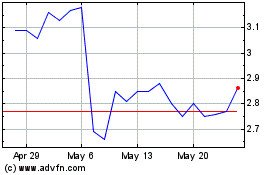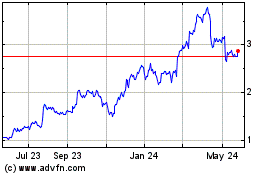In Our Normalization Era: Talkspace’s Second Annual Survey Validates Surge in Mental Health Openness and Calls for Greater Mental Health Care Access Across Generations
August 01 2024 - 8:00AM
Business Wire
• 85% of respondents believe
people are more open to therapy than they were 5 years ago •
84% of respondents are not confident government policy
makers are prioritizing mental health care accessibility and
affordability • Gen Z and 65+ respondents tie for
citing loneliness as a top concern
Talkspace (NASDAQ: TALK), a leading online behavioral health
company, today released the results of its second annual New
Normalization survey. This year’s report titled, “In Our
Normalization Era,” found that openness around mental health
conversations continues to grow across all generations, with
respondents significantly more open to discussing their mental
health than they were five years ago. It also revealed that
expectations for mental health support from employers and the
government remain overwhelmingly high, but that 84% of respondents
are not confident that federal, state and local leaders are
prioritizing mental health care accessibility and
affordability.
Echoing last year’s results, respondents affirmed that mental
health talk is no longer taboo, and going to therapy is seen as
routine. In fact, 85% of respondents believe people are more open
to therapy than they were 5 years ago, up from 81% in 2023.
Additionally, respondents reported less stigma and more acceptance
of discussing mental health challenges with their peers.
Sixty-eight percent (68%) are more likely to discuss mental health
with their friends, up from 65% in 2023, and 65% are more likely to
discuss mental health with their partner, up from 60% in 2023. The
survey also found that mental health now qualifies as an everyday
discussion topic. Respondents ranked it among the top 3 personal
topics they regularly discuss with their friends, speaking about it
more openly than politics, religion, sex, or finances.
“At Talkspace, we believe that mental health should be a
fundamental part of healthcare. Just as we have a primary care
physician, we should have a licensed mental health professional to
whom we can turn for regular care. Our latest survey confirms that
people are more willing than ever to discuss their mental health
and seek therapy, breaking down stigmas that have existed for far
too long,” said Jon R. Cohen, MD, CEO of Talkspace. “There is a
clear need for comprehensive mental health benefits and an
expectation that support systems are in place to ensure the
well-being of all individuals.”
Other key takeaways from the survey include:
Insights from Gen Z to the Greatest Generation:
- The survey revealed that younger generations, particularly Gen
Z, are perceived to experience the most mental health challenges
like loneliness and depression, but are also perceived as the most
open to seeking therapy compared to other generations by far.
- As for the loneliness epidemic, among our community it is most
reflected in the experience of the youngest (18-24) and oldest
(65+) cohorts. For those age groups it was ranked #4 as a topic
frequently discussed in therapy, but it didn’t make the top 5 for
other generations.
- Top topics discussed in therapy (all generations): Relationship
issues with my family (57%), relationship issues with my partner or
significant other (54%), trauma from my past (51%), low sense of
self worth (42%), work or work relationships (42%), loneliness
(29%).
Expectations of healthcare coverage, employers and higher ed
institutions:
- 99% believe mental health treatment should be covered by
insurance, even for people who don’t have a diagnosed condition, in
the same way that preventive care is covered for physical
health.
- Among full-time employed respondents, mental health benefits
rank the #1 benefit they want to receive from their employer, ahead
of flex days (#2) and remote work options (#3).
- 98% of college students surveyed overwhelmingly believe that
mental health support should be provided by their
institutions.
Bi-Partisan Plea: Elected leaders are viewed as neglecting
mental health
- 84% of respondents are not confident that federal, state, and
local leaders are prioritizing mental health care accessibility and
affordability.
- When prompted further on this topic, the majority (60%) believe
that members of both major political parties are equally negligent
in this area, while 30% believe that one party is doing a better
job than the other of prioritizing people’s mental health
needs.
Talkspace surveyed 3,144 current, former, and prospective
members of their virtual therapy offerings between March 20-26,
2024. The survey was created and analyzed in partnership with the
Talkspace research department. The results of the survey do not
necessarily represent the general population. No personal health
information was collected during the administration of the survey,
and each respondent was made aware that the survey was
anonymous.
Click here to download the survey report (free but requires
email address).
About Talkspace
Talkspace (NASDAQ: TALK) is a leading virtual behavioral
healthcare company committed to helping people lead healthier,
happier lives through access to high-quality mental healthcare. At
Talkspace, we believe that mental healthcare is core to overall
health and should be available to everyone.
Talkspace pioneered the ability to text with a licensed
therapist from anywhere and now offers a comprehensive suite of
mental health services from self-guided products to individual and
couples therapy, in addition to psychiatric treatment and
medication management. With Talkspace’s core psychotherapy
offering, members are matched with one of thousands of licensed
providers across all 50 states and can choose from a variety of
subscription plans including live video, text or audio chat
sessions and/or unlimited, asynchronous text messaging.
All care offered at Talkspace is delivered through an
easy-to-use, fully encrypted web and mobile platform that meets
HIPAA, federal, and state regulatory requirements. Talkspace
covered approximately 112 million lives as of May 2, 2023, through
our partnerships with employers, health plans, and paid benefits
programs.
For more information, visit www.talkspace.com.
View source
version on businesswire.com: https://www.businesswire.com/news/home/20240801128549/en/
Zef Vataj | zvataj@sloanepr.com
Talkspace (NASDAQ:TALK)
Historical Stock Chart
From Dec 2024 to Jan 2025

Talkspace (NASDAQ:TALK)
Historical Stock Chart
From Jan 2024 to Jan 2025
